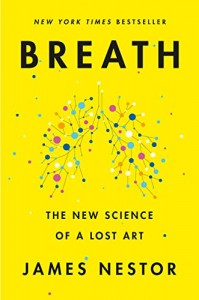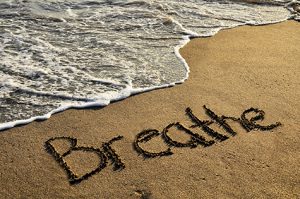Take a Breath! It Can Change Everything


 No matter what you eat, how much you exercise, how skinny or young or wise you are, none of it matters if you’re not breathing properly. There is nothing more essential to our health and well-being than breathing: take air in, let it out, repeat twenty-five thousand times a day. Breathing is an essential function for our health and wellbeing, an exercise so basic to sustaining life that we do it without even thinking. But it’s also a lost art. Humans have forgotten how to breathe correctly, so the journalist James Nestor traveled the world to find out where we went wrong.
No matter what you eat, how much you exercise, how skinny or young or wise you are, none of it matters if you’re not breathing properly. There is nothing more essential to our health and well-being than breathing: take air in, let it out, repeat twenty-five thousand times a day. Breathing is an essential function for our health and wellbeing, an exercise so basic to sustaining life that we do it without even thinking. But it’s also a lost art. Humans have forgotten how to breathe correctly, so the journalist James Nestor traveled the world to find out where we went wrong.
In his book, Breath: The New Science of a Lost Art, James Nestor theorizes that the answers aren’t found in pulmonology labs, as we might expect, but in the muddy digs of ancient burial sites, secret Soviet facilities, New Jersey choir schools, and the smoggy streets of São Paulo. Nestor tracks down men and women exploring the hidden science behind ancient breathing practices like Pranayama, Sudarshan Kriya, and Tummo. He teams up with pulmonary tinkerers to scientifically test long-held beliefs about how we breathe. Modern research is showing us that making even slight adjustments to the way we inhale and exhale can jump-start athletic performance; rejuvenate internal organs; halt snoring, asthma, and autoimmune disease; and even straighten scoliotic spines. None of this should be possible, and yet it is.
While researching the science and culture of breathing for his new book, Nestor participated in a study in which his nose was completely plugged for 10 days, forcing him to breathe solely through his mouth. It was not a pleasant experience.
“I went from snoring a couple minutes a night to, within three days, I was snoring four hours a night,” he says of the forced mouth-breathing. “I developed sleep apnea. My stress levels were off the charts. My nervous system was a mess. … I felt awful.”
Nestor says the researchers he’s talked to recommend taking time to “consciously listen to yourself and [to] feel how breath is affecting you.” He notes taking “slow and low” breaths through the nose can help relieve stress and reduce blood pressure.
“This is the way your body wants to take in air,” Nestor says. “It lowers the burden of the heart if we breathe properly and if we really engage the diaphragm.”
Nestor’s goal is not simply for the reader to understand the science behind proper breathing but to plunge in and transform our own lungs and our lives; an appendix provides breathing exercises tied to each chapter, with the offer of video and audio tutorials on his website.
 Some drills are easy: chewing Falim, a tough Turkish gum, to “strengthen the jaw and stimulate cell growth.” Others are fun: humming to your favorite songs increases nitric oxide release 15-fold, which widens capillaries and increases oxygenation. And most are simple enough: inhaling for 5.5 seconds then exhaling for that long to slow and deepen your breathing.
Some drills are easy: chewing Falim, a tough Turkish gum, to “strengthen the jaw and stimulate cell growth.” Others are fun: humming to your favorite songs increases nitric oxide release 15-fold, which widens capillaries and increases oxygenation. And most are simple enough: inhaling for 5.5 seconds then exhaling for that long to slow and deepen your breathing.
Book highlights include:
- Why nose breathing is better than mouth breathing: Inhaling through the nose can trigger different hormones to flood into our bodies, lowers our blood pressure, monitors our heart rate and even helps store memories. So, it’s this incredible organ that orchestrates innumerable functions in our body to keep us balanced.
 How breath affects anxiety: People with anxieties or other fear-based conditions typically will breathe way too much. What happens when you breathe that much? You’re constantly putting yourself into a state of stress. You’re stimulating that sympathetic side of the nervous system. And the way to change that is to breathe deeply.
How breath affects anxiety: People with anxieties or other fear-based conditions typically will breathe way too much. What happens when you breathe that much? You’re constantly putting yourself into a state of stress. You’re stimulating that sympathetic side of the nervous system. And the way to change that is to breathe deeply.- Why exhaling helps you relax: The diaphragm lowers when we take a breath in, and that sucks a bunch of blood — a huge profusion of blood — into the thoracic cavity. As we exhale, that blood shoots back out through the body.
Drawing on thousands of years of medical texts and recent cutting-edge studies in pulmonology, psychology, biochemistry, and human physiology, Breath turns the conventional wisdom of what we thought we knew about our most basic biological function on its head. You will never breathe the same again.
